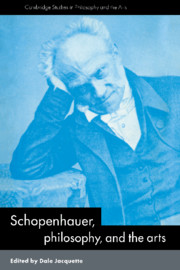Book contents
- Frontmatter
- Contents
- List of contributors
- Editor's acknowledgments
- List of abbreviations
- 1 Schopenhauer's metaphysics of appearance and Will in the philosophy of art
- PART I The work of art: Schopenhauer on the nature of artistic creation
- PART II The experience of beauty: Schopenhauer's theory of aesthetic encounter
- PART III Schopenhauer's enduring influence on the arts: idealism and romanticism
- Bibliography of selected sources on Schopenhauer's aesthetics
- Index
1 - Schopenhauer's metaphysics of appearance and Will in the philosophy of art
Published online by Cambridge University Press: 05 May 2010
- Frontmatter
- Contents
- List of contributors
- Editor's acknowledgments
- List of abbreviations
- 1 Schopenhauer's metaphysics of appearance and Will in the philosophy of art
- PART I The work of art: Schopenhauer on the nature of artistic creation
- PART II The experience of beauty: Schopenhauer's theory of aesthetic encounter
- PART III Schopenhauer's enduring influence on the arts: idealism and romanticism
- Bibliography of selected sources on Schopenhauer's aesthetics
- Index
Summary
INTRODUCTION
The essays collected in this volume are previously unpublished writings by some of the most respected contemporary scholars of Arthur Schopenhauer's philosophy and the history and philosophy of art. The idea of the collection is to highlight three aspects of Schopenhauer's aesthetics: his metaphysics and psychology of artistic creativity, his theory of the appreciation of beauty and the sublime, and his influence on the development of the philosophy and practice of the fine arts.
I hope that while engaging the specialist the book will also serve as a friendly introduction for those who have not yet looked into Schopenhauer's pages, and for whom no prior knowledge of Schopenhauer is assumed. The reader will find here a stimulating selection of detailed, comprehensive, but highly accessible studies in Schopenhauer's aesthetics, in the history and theory of art from Plato to major thinkers of the eighteenth, nineteenth and early twentieth centuries, and in the evolution of idealism, symbolism, and romanticism in music, literature, painting, and architecture.
Schopenhauer's impact on such diverse thinkers as Nietzsche, Freud, and Wittgenstein is widely recognized, and his insights into the metaphysics of the human condition have been touchstones for generations of philosophers, social-psychological theorists, and others in search of a personal philosophy. The idealism set forth in Schopenhauer's system serves as a counterpoise to the post-Kantianism of Fichte, Schelling, and Hegel, against whom Schopenhauer reinterprets Kant's critical idealism as its self-proclaimed only legitimate heir.
- Type
- Chapter
- Information
- Schopenhauer, Philosophy and the Arts , pp. 1 - 36Publisher: Cambridge University PressPrint publication year: 1996
- 5
- Cited by

